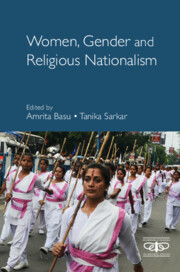Book contents
- Frontmatter
- Dedication
- Contents
- List of Abbreviations
- Introduction: Women of Hindu Rashtra
- Part I Changing Modalities of Hindu Nationalist Organizing
- Part II Gendered Techniques of Mobilization: The Sangh and the Samiti
- Part III Cultivating Women’s Militancy: The Vishva Hindu Parishad
- Part IV Refashioning Gender and Sexuality
- Part V Alternative Activist Responses to the Hindu Right
- Glossary
- About the Contributors
- Index
4 - Spinning the Saffron Yarn: Lessons of Ideal Girlhood in Hindu Nationalist Storytelling
Published online by Cambridge University Press: 12 August 2022
- Frontmatter
- Dedication
- Contents
- List of Abbreviations
- Introduction: Women of Hindu Rashtra
- Part I Changing Modalities of Hindu Nationalist Organizing
- Part II Gendered Techniques of Mobilization: The Sangh and the Samiti
- Part III Cultivating Women’s Militancy: The Vishva Hindu Parishad
- Part IV Refashioning Gender and Sexuality
- Part V Alternative Activist Responses to the Hindu Right
- Glossary
- About the Contributors
- Index
Summary
Introduction
Training to become a member of the Sangh Parivar (Sangh Family), India's largest and most influential Hindu nationalist collective, begins at an early age. Games, songs and stories are used to transmit Hindutva, or Hindu nationalist thought. In shakhas (meetings held daily, weekly or during camps) across the country, members place a special focus on storytelling and its didactic nature, an aspect that is enjoyed by listeners young and old. Pedagogic authorities everywhere have used storytelling as a mode of ideological introduction and propagation. How does the ‘method’ of storytelling modify itself in the service of the thought – how is it adapted, received and reproduced, and how does it become gendered? Why are many of the stories set in a historical time period, and what role does historicity play in the telling of these stories? These are the questions that would be engaged with in this chapter.
The empirical data for this chapter comes from two sources: textual (biographies of Rashtra Sevika Samiti [National Women Volunteers, henceforth Samiti] members and short stories of ‘ideal women’) and participant observations (from an annual summer camp of the organization in Delhi [2017] and Meerut [2013]), and shakhas across Delhi (March–June 2018). Stories from four books (from the Samiti's publication unit) and participant-observation data were analysed. Out of the four books, two were in Hindi and two in English. The fieldwork was conducted in Hindi. The publication materials have been divided into two: first are the stories of the influential members of the Samiti; second types of publication materials are the stories deploying historical figures (important women of the Hindu nationalist movement) that are written to highlight the important aspects of the ideology. Using the stories told by Samiti members (orally and textually), I attempt to outline the stories’ main themes as messages of the Hindu nationalist thought.
In this chapter, I show that these stories are important vehicles of socialization into the ideology. They are essential to the progress of the Sangh Parivar apparatus and their core project of writing a Hindutva history. There are two goals for this chapter. The first goal is to illustrate the larger objective of the Sangh Parivar to shape Hindu nationalist history. Second, the specific aim of Samiti's storytelling is to show how stories most effectively shape a gendered vision of Hindu nationalism.
- Type
- Chapter
- Information
- Women, Gender and Religious Nationalism , pp. 125 - 146Publisher: Cambridge University PressPrint publication year: 2022



